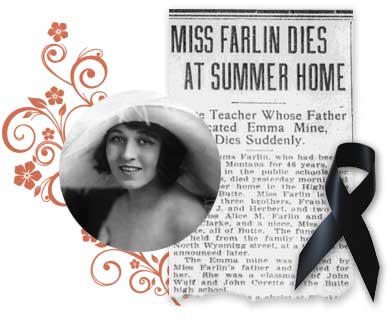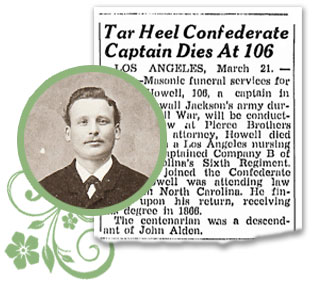Obit for Mable Blue of Fayetteville Tn in 1999
Search Obituaries 1690-Today
Find your ancestors' obituaries & discover your family story
Enter Your Ancestor's Name Below:

Search Newspaper Obituaries

Why Search Obituaries for Family History Research?
An obituary search is more than just knowing when your ancestor died. Obituaries are mini-narratives of a person's life highlighting major happenings between "born on" and "deceased on." Discover how your ancestors lived, loved, and how they were remembered. Most of all, an obituary search is often the missing link or the key starting point for learning more about your family history. Although obituaries published in newspapers cannot replace the official death records, you can learn critical details about your ancestors. Some of the facts you can find in obituaries & death notices:
- Name, place and year of birth
- Names of children, where they lived, and their position in the family's birth order
- Names of the towns and cities of residence and how long they lived in each one
- Age of spouse (husband, wife) at death and how long ago that was
- Details on the longevity of parents and grandparents
- Name of cemetery, date and place of the funeral and burial
How to Find an Obituary for a Specific Person in the US
To find an obituary, enter the deceased person's last name in the search bar at the top of the page. You can narrow down your search by adding date ranges and geographical information of where the deceased lived. This is the best way to find obituaries printed in any US newspaper.
Our obituary archives include over 291 million newspaper obituaries and death records covering over 327 years from over 13,000 newspapers. And new obituary records are added daily. You can search for obituaries by name, state, city or newspaper publication to narrow your search.
Helpful Obituary Search Tips:
- Expand your obituary search to include multiple localities and newspapers.
- Obituaries are frequently published in the local newspapers where your deceased ancestor resided or other family members lived.
- Search only by a person's last name.
- If you can't find an obituary for a recently deceased relative by first and last name, try a broader search by just their last name to capture more results

What Can a U.S. Obituary Search Tell You About Your Ancestors?
- Obituaries are exactly as published in local, state, and national U.S. newspapers.
- We receive the same "feed" from the newspapers that they send to printing plants.
- Our online obituary archive is updated throughout the day and even includes the obituaries that will appear in tomorrow's newspapers from across the country. Read More
A brief history of obituaries
Various types of headers had been used for obituaries over the years, including Deaths, Obituaries, Died, In Memoriam, In Remembrance, Memorials, etc.
Obituaries have been present in newspapers for centuries. As newspapers changed over the years, so did obituaries, but their essence has remained the same to this day.
Before the linotype machine was invented in 1886, publishers used to set by hand the type for printing daily newspapers. The process took time, which is why newspapers only used to have several pages (only four pages in most cases). With fewer pages, there was limited space for ads and news articles, so the obituaries were usually very short.
In most cases, an obituary was just a one-liner announcing that a certain person had died. The newspaper editors used to decide who should have a more comprehensive obituary, based on the deceased's status and popularity in the community. Famous people and those whom the editors thought would be of significant general interest would get more detailed obituaries.
- The length of a person's funeral obituary depended on several things:
- How important they were for the community
- How much time the editors needed to spend researching about the deceased in order to write the obituary
- If the obituary needs to tell an important story
As centuries went by, and towns turned into cities, families started writing obituaries on their own so that they would include more important details about their relatives. The newspaper industry defined a new term for these user-written obituaries, "Death Notes." Newspapers started including them as paid advertisements and began charging for publishing obituaries. The price of an obituary usually depended on the word count, the number of insertions, and the inclusion of photos.
What can we learn from an obituary search?
An obituary search can tell you a lot of details about a particular person. As a published death announcement, it may be a tribute with an elaborate biography, or a simple, short death notice. Through an obituary lookup, you can discover various information about the deceased or his/her family members.
Usually, obituaries contain the name of the deceased and the burial date. Although, they may not reveal the death date. Therefore, you may need to figure it out using other details such as the date when the obituary was published. However, as you will realize using the obituary finder, obituaries also often contain more in-depth information such as the birth date, names of spouse, parents and children, marriage date, social status, occupation, education, and more. In many obituaries, you can find the location of the family members of the deceased at the time they were published.
An obituaries search can be a comprehensive process but the information you may find could be worth your while.
Why are obituary archives Important?
Every obituary tells a little story about a person's life. Often, they tell you whether or not the person was married, who their children were, who their parents were, the names of their spouses, and many other details. When you search obituaries, often what you find is the only time a certain person has appeared in a newspaper. Obituaries are considered a lasting written record of someone's existence. Obituary archives can bring together family, ancestors, friends, life partners, and sometimes even distant strangers.
They play a crucial role in preserving history. One obituary represents a written trace of a person's life. Whereas, many obituaries from the same community or same period will open a window into the lives of our ancestors and their communities. To find the obituary of a person means finding a hidden door that leads to amazing discoveries. Obituaries connect us through space and time, and they help us discover important details about family members and friends, preserving vital parts of history and keeping them safe for generations to come.
What can obituary searches be used for?
The details you discover may open up an interesting research adventure. For example, the obituary of your immigrant ancestor may give you clues to their birthplace, so that you may be able to trace your family's roots.
If you search obituaries by name, you may be able to discover the maiden names of your female ancestors. A man's obituary may contain his sister's or daughter's married name, and you may not be able to find that information anywhere else. When you find obituaries of your relatives, ancestors, or friends, you will find detailed biographies. You will be able to learn their background in their community, what they did for a living, if they were a church member, or if they belonged to a certain society or distinguished group.
A death notice search will take you back through time and give you an insight into the life of your ancestor and their closest family members.
hildebrandfirig1972.blogspot.com
Source: https://www.genealogybank.com/explore/all-obits
0 Response to "Obit for Mable Blue of Fayetteville Tn in 1999"
Post a Comment